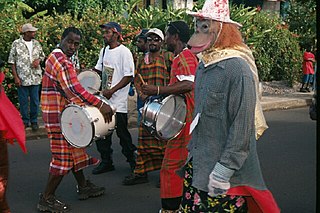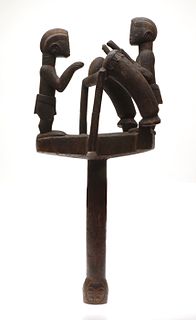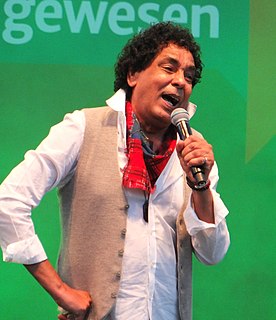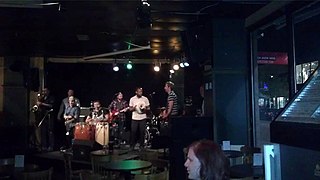Hip hop music has been popular in Africa since the early 1980s due to widespread African American influence. In 1985 hip hop reached Senegal, a French-speaking country in West Africa. Some of the first Senegalese rappers were M.C. Lida, M.C. Solaar, and Positive Black Soul.
The music of Louisiana can be divided into three general regions: rural south Louisiana, home to Creole Zydeco and Old French, New Orleans, and north Louisiana. The region in and around Greater New Orleans has a unique musical heritage tied to Dixieland jazz, blues, and Afro-Caribbean rhythms. The music of the northern portion of the state starting at Baton Rouge and reaching Shreveport has similarities to that of the rest of the US South.

The music of Dominica includes a variety of genres including all the popular genres of the world. Popular music is widespread, with a number of native Dominican performers gaining national fame in imported genres such as calypso, reggae, soca, kompa, zouk and rock and roll. Dominica's own popular music industry has created a form called bouyon, which combines elements from several styles and has achieved a wide fanbase in Dominica. Groups include WCK, Native musicians in various forms, such as reggae, kadans (Ophelia Marie, and calypso, have also become stars at home and abroad.

The music of Ivory Coast includes music genres of many ethnic communities, often characterised by vocal polyphony especially among the Baoulé, talking drums especially among the Nzema people and by the characteristic polyrhythms found in rhythm in Sub-Saharan Africa.
Filipino hip-hop or Pinoy hip hop is hip hop music performed by musicians of Filipino descent, both in the Philippines and overseas, especially by Filipino-Americans.

Mohamed Mounir is an Egyptian singer and actor, with a musical career spanning more than four decades. He incorporates various genres into his music, including classical Egyptian Music, Nubian music, blues, jazz and reggae. His lyrics are noted both for their philosophical content and for their passionate social and political commentary. He is affectionately known by his fans as "The King" in reference to his album and play "El Malek Howwa El Malek". Mounir's family is from Nubia, Southern Aswan, Egypt.
Hiplife is a Ghanaian musical style that fuses Ghanaian culture and hip hop. Recorded predominantly in the Ghanaian Akan language, hiplife is rapidly gaining popularity in the 2010s throughout West Africa and abroad, especially in the United Kingdom, United States, Canada and Germany.
Cadence-lypso is a fusion of cadence rampa from Haiti and calypso from Trinidad & Tobago that has also spread to other English speaking countries of the Caribbean. Originated in the 1970s by the Dominican band Exile One on the island of Guadeloupe, it spread and became popular in the dance clubs around the Creole world and Africa as well as the French Antilles.

Louisiana Creoles are people descended from the inhabitants of colonial Louisiana before it became a part of the U.S. during the period of both French and Spanish rule. As an ethnic group, their ancestry is mainly of African, French, Spanish and Native American origin. German, Irish, and Italian immigrants also married in to these groups. Louisiana Creoles share cultural ties such as the traditional use of the French, Spanish, and Louisiana Creole languages and predominant practice of Catholicism.
Rasin, also known as Haitian roots music, is a musical style that began in Haiti in the 1970s when musicians began combining elements of traditional Haitian Vodou ceremonial and folkloric music with various musical styles. The late 20th century style of this music links to the roots of Vodou tradition, where it came to be known as mizik rasin later in Haitian Creole. Modern-day, the movement is often referred to simply as "rasin" or "racine".
Bouyon is a genre of Dominican music that originated in Dominica in the late 1980s mainly with the group "WCK", with names such as Derek "Rah" Peters on vocals, Cornell Phillips keys and vocals among others, while bands such as the "Triple Kay" are very popular with "Carlyn XP" being the undisputed MCs for having won numerous contests. Dominican singers such as "Asa Banton", "Suppa", "Benz Mr Gwada","Rio" and"Gaza Girl" became popular years later.
The culture of Saint Martin is a blend of its African, French, British, and Dutch heritage. Although St. Martin is a single island, it contains two separate nations: Saint-Martin, a French overseas collectivity; and Sint Maarten, part of the Kingdom of the Netherlands. Although each side's culture is influenced by their respective administering countries, they share enough similar heritage and traditions that it can be difficult to tell where Saint-Martin ends and Sint Maarten begins.

Afrodizz is an eight-member afrobeat/afrofunk band from Montreal. Their music is a modern mix of afrobeat, jazz and funk, that has been described as having nuances of The Herbaliser and Tony Allen.
The term Caribbean culture summarizes the artistic, musical, literary, culinary, political and social elements that are representative of Caribbean people all over the world.
"Zumba He Zumba Ha" is a 2011 international hit song by DJ Mam's in Spanish, French and in creole, a French dialect spoken in Martinique and Guadeloupe. The song is written and composed by Mounir Belkhir, Luis Guisao and Soldat Jahman. The original hit was released by Mam's featuring Soldat Jahman & Luis Guisao on January 30, 2011, and followed by a remix released in May 2012 by DJ Mam's featuring Jessy Matador & Luis Guisao that also became a hit.

Morad Mameri better known by his stage name DJ Mam's born in Marseille, France in 1972 is a Marseille-based French DJ of Algerian descent. He is signed to Wagram music label.
"Fiesta Buena" is a 2012 international hit song by DJ Mam's in Spanish and is credited to DJ Mam's featuring Luis Guisao, Soldat Jahman and Beto Perez. The song is written and composed by Mounir Belkhir, Luis Guisao and Soldat Jahman.

Fiesta Buena is a multilingual album by French DJ of Algerian descent following his great success with "Zumba He Zumba Ha". The album contains songs using various languages: French, Spanish, Arabic and local North African dialects, creole, a French dialect spoken in Martinique and Guadeloupe. Most of the songs are written in collaboration between Mounir Belkhir, Luis Guisao and Soldat Jahman.
Soldat Jahman also known as Jah-Man or Jahman, is a French ragga hip hop artist originating from the Martinique combining also various influences like reggaeton and rap.
Mauritian Australians are Australians of Mauritian descent, or who were born in Mauritius.






